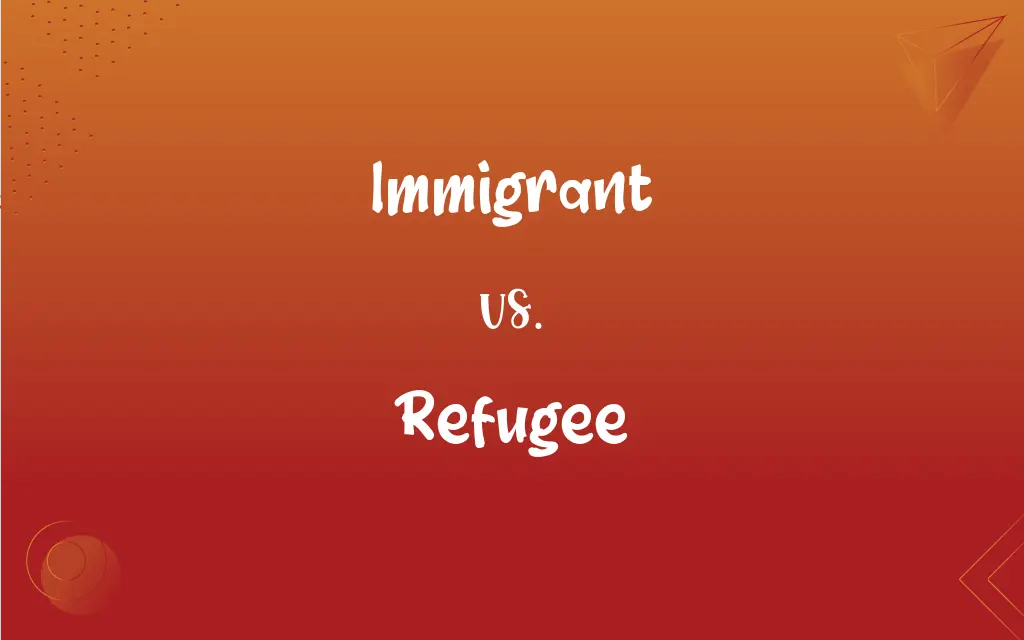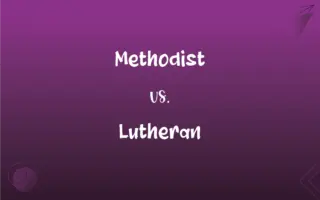Immigrant vs. Refugee: What's the Difference?
Edited by Aimie Carlson || By Harlon Moss || Published on January 15, 2024
Immigrant is a person who moves to a foreign country for various reasons, like work or family. Refugee is a person who flees their home country due to war, persecution, or disaster.

Key Differences
An immigrant is an individual who chooses to resettle in a new country, often for reasons such as employment, education, or family reunification. A refugee, on the other hand, is forced to flee from their country due to threats of persecution, war, or violence. Both groups seek a new life but under different circumstances.
Immigrants usually undergo a legal process to reside in the new country, often seeking permanent residence or citizenship. Refugees are granted asylum due to their urgent need for protection and typically cannot return home safely. Both require legal acknowledgment from the host country, but under different legal frameworks.
The motivation behind immigration is often for better opportunities or personal choice. Refugees flee due to an immediate threat to their safety and lack of protection in their home country. Both immigrants and refugees contribute to the cultural and economic diversity of the host nation.
Immigrants often plan their move and might voluntarily choose their destination country. Refugees, however, are compelled to leave quickly, sometimes without a destination in mind. Both face challenges of adaptation and integration into new societies.
In terms of support, immigrants might receive it from family or community networks already established in the new country. Refugees often rely on assistance from governments or international organizations, as they might not have such networks. Both groups seek stability and safety in their new environments.
ADVERTISEMENT
Comparison Chart
Reason for Moving
Personal choice, better opportunities.
Fleeing war, persecution, or disaster.
Legal Status
Undergoes immigration process for residency.
Granted asylum due to urgent need for safety.
Motivation
Employment, education, family reunification.
Immediate threat to safety.
Choice of Destination
Often planned and voluntary.
Often urgent and involuntary.
Support Systems
May have family/community support.
Often rely on government/international aid.
ADVERTISEMENT
Immigrant and Refugee Definitions
Immigrant
An immigrant is a person who moves to a new country to reside.
The immigrant found a job in the new country to support her family.
Refugee
Refugees often need international or governmental assistance.
The refugee received aid from a humanitarian organization.
Immigrant
Their move is generally a personal or economic choice.
The immigrant chose to relocate for a higher-paying job.
Refugee
They are often unable to return home safely.
The refugee couldn’t return home due to ongoing conflict.
Immigrant
Immigrants may become permanent residents or citizens.
The immigrant applied for citizenship after living in the country for five years.
Refugee
Refugees seek protection and asylum in another country.
The refugee applied for asylum upon arrival in the host country.
Immigrant
Immigrants contribute to the cultural diversity of their new country.
The immigrant shared her cultural traditions with her new community.
Refugee
A refugee flees their country due to war, persecution, or disaster.
The refugee sought asylum after escaping war in his homeland.
Immigrant
They often seek better opportunities or family reunification.
The immigrant moved for a better education.
Refugee
Their displacement is usually urgent and involuntary.
The refugee had to leave her home suddenly due to rising violence.
Immigrant
A person who leaves one country to settle permanently in another.
Refugee
One who flees, especially to another country, seeking refuge from war, political oppression, religious persecution, or a natural disaster.
Immigrant
An organism that establishes itself in an area where it previously did not exist.
Refugee
A person seeking refuge in a foreign country out of fear of political persecution or the prospect of such persecution in their home country, i.e., a person seeking political asylum.
Immigrant
Of or relating to immigrants or the act of immigrating.
Refugee
A person seeking refuge due to a natural disaster, war, etc.
Immigrant
A non-native person who comes to a country from another country to permanently settle there.
Refugee
A person formally granted political or economic asylum by a country other than their home country.
Immigrant
A plant or animal that establishes itself in an area where it previously did not exist.
Refugee
(by extension) A person who flees one place or institution for another.
Immigrant
Of or relating to immigrants or the act of immigrating.
Refugee
To convey (slaves) away from the advance of the federal forces.
Immigrant
One who immigrates; one who comes to a country for the purpose of permanent residence; - correlative of emigrant.
Refugee
One who flees to a shelter, or place of safety.
Immigrant
A person who comes to a country where they were not born in order to settle there
Refugee
Especially, one who, in times of persecution or political commotion, flees to a foreign power or country for safety; as, the French refugees who left France after the revocation of the edict of Nantes.
Refugee
An exile who flees for safety
FAQs
What is an immigrant?
Someone who relocates to another country, often for personal reasons.
Do refugees choose where they go?
Often, they do not have a choice and must flee to the nearest safe country.
What is a refugee?
A person who flees their home due to war, persecution, or disaster.
Can immigrants become citizens?
Yes, immigrants can apply for citizenship in their new country.
Are immigrants always legal residents?
Not always; they must go through a legal process to become residents.
How are refugees protected?
Refugees are protected under international law and can receive asylum.
Can refugees work in the host country?
This depends on the laws of the host country and the refugee's status.
Are refugees allowed to return home?
They may return if the conditions in their home country improve.
Is it easy for refugees to integrate?
Integration can be challenging due to trauma, language, and cultural differences.
Do immigrants need a visa?
Yes, immigrants typically need a visa or other legal documentation.
What challenges do immigrants face?
Adapting to a new culture, language barriers, and employment issues.
Can immigrants bring their families?
This depends on the immigration laws of the host country.
How long can a refugee stay in the host country?
This varies depending on the individual's situation and host country policies.
Can immigrants own property?
Yes, if they meet the legal requirements of the host country.
What is the difference between an immigrant and an expatriate?
An expatriate temporarily lives abroad, often for work, while an immigrant permanently moves.
Why do people choose to immigrate?
For various reasons, including employment, education, or family.
Do immigrants pay taxes?
Yes, immigrants pay taxes in their new country.
Do refugees have legal rights in the host country?
Yes, they have certain rights under international and host country laws.
Can a refugee become a citizen of the host country?
Yes, depending on the laws of the host country and the individual's circumstances.
What support do refugees receive?
They often receive support from governments and international agencies.
About Author
Written by
Harlon MossHarlon is a seasoned quality moderator and accomplished content writer for Difference Wiki. An alumnus of the prestigious University of California, he earned his degree in Computer Science. Leveraging his academic background, Harlon brings a meticulous and informed perspective to his work, ensuring content accuracy and excellence.
Edited by
Aimie CarlsonAimie Carlson, holding a master's degree in English literature, is a fervent English language enthusiast. She lends her writing talents to Difference Wiki, a prominent website that specializes in comparisons, offering readers insightful analyses that both captivate and inform.






































































